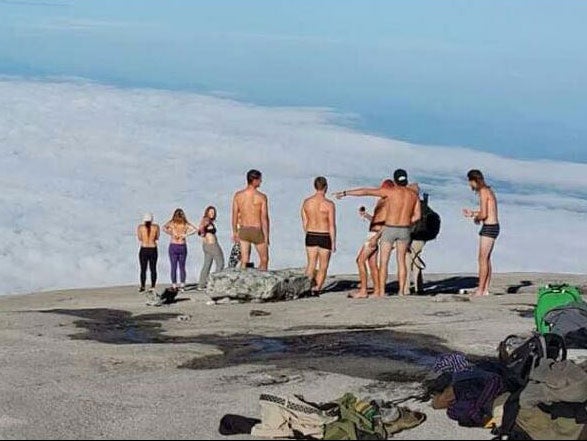Malaysia tourist arrests: I’ve witnessed the method in the country's superstitious madness
Malaysia is a highly diverse and tolerant country, but non-rational belief systems still hold sway to a huge extent

Your support helps us to tell the story
From reproductive rights to climate change to Big Tech, The Independent is on the ground when the story is developing. Whether it's investigating the financials of Elon Musk's pro-Trump PAC or producing our latest documentary, 'The A Word', which shines a light on the American women fighting for reproductive rights, we know how important it is to parse out the facts from the messaging.
At such a critical moment in US history, we need reporters on the ground. Your donation allows us to keep sending journalists to speak to both sides of the story.
The Independent is trusted by Americans across the entire political spectrum. And unlike many other quality news outlets, we choose not to lock Americans out of our reporting and analysis with paywalls. We believe quality journalism should be available to everyone, paid for by those who can afford it.
Your support makes all the difference.Eleanor Hawkins, the young British woman arrested for taking part in a naked photo-shoot on top of Mount Kinabalu, days before it was rocked by a deadly earthquake, probably feels she is in the midst of a nightmare right now.
She and her companions had just completed a gruelling 13,435-foot ascent of South-east Asia’s highest peak, and decided, in a moment of exuberance, to disrobe and take pictures.
The incident, swiftly uploaded on to social media, had already caused offence in the Malaysian state of Sabah on the island of Borneo. Signs on the mountain explicitly warn “public nudity prohibited” and the exhibitionists won no friends for reportedly calling their guide “stupid” and telling him to “go to hell” when he urged them to be respectful of a site considered sacred and the home of ancestral spirits by indigenous people.
Less than a week later, a 5.9-magnitude earthquake struck the area, killing at least 18 people and leaving a community, and a nation, in mourning. The day after, Joseph Pairin Kitingan, Sabah’s deputy chief minister, linked the two events. “There is almost certainly a connection,” he said. “We have to take this as a reminder that local beliefs and customs are not to be disrespected. Whether other people believe this or not, it’s what we Sabahans believe.”
The group had already infuriated state authorities enough for one minister to vow to “kick them out” of Sabah. After the earthquake, however, they may face charges that could lead to three months in jail.
The Malaysian government will not want to make this into an international incident, and will probably advise leniency and a swift exit for the offenders. But, pace Miss Hawkins, who doubtless is “very sorry” for the offence caused, the group should have been more respectful – much more. It may seem ridiculous to visitors from post-Christian societies that elevate rationalism and science above all that there are still countries where ancient rivers of animism still run deep, where superstitions if not actual beliefs about “hantu” – ghosts – are widespread, and in which faith in the supernatural is the norm. But there are. In fact, welcome to the rest of the world.
Because such beliefs – especially about spirits linked to nature – are now near-absent from Western societies, there is a condescending attitude that only the half-witted could continue to entertain them. As Emil Kaminski, a Canadian travel blogger who "trolled the world's media" in making them believe he was one of the tourists arrested (he wasn't even in Malaysia), puts it so eloquently on his website: “We are often told to travel, but then to just brainlessly conform to local cultures, customs, not question anything, that is the biggest serving of bullshit you could possibly step in.”
Would it, then, be equally acceptable for foreign tourists to take their clothes off in Canterbury Cathedral, the Houses of Parliament or Buckingham Palace, on the grounds that visitors don’t see what’s so special about these iconic – arguably sacred – symbols of British culture and heritage?
The Kinabalu nudists displayed not just a profound ignorance of, and disrespect for, local culture. Their arrogant behaviour suggested that opening their sacred places to tourists meant that locals should shed their beliefs so that incomers could get away with shedding their briefs.
Malaysia is a highly diverse and tolerant country and visitors can by and large do what they like. But, as in most of the world beyond Europe, non-rational belief systems still hold sway to a huge extent. The late President Suharto of Indonesia and Senior General Than Shwe of Burma regularly used to consult soothsayers. I have been to a beachfront wedding in Malaysia where the mother of the bride cast a traditional spell to stop the rain (it worked – and for precisely the duration of the open air ceremony).
Outsiders can scoff all they like. But Eleanor Hawkins – for whom I have much sympathy – has learned the hard way what ought to be much more obvious to Westerners keen to explore the rest of the world. If you believe you are entitled to dismiss or ignore local customs or sensitivities, it’s best you don’t go.
Otherwise, be prepared for the consequences.
Join our commenting forum
Join thought-provoking conversations, follow other Independent readers and see their replies
Comments